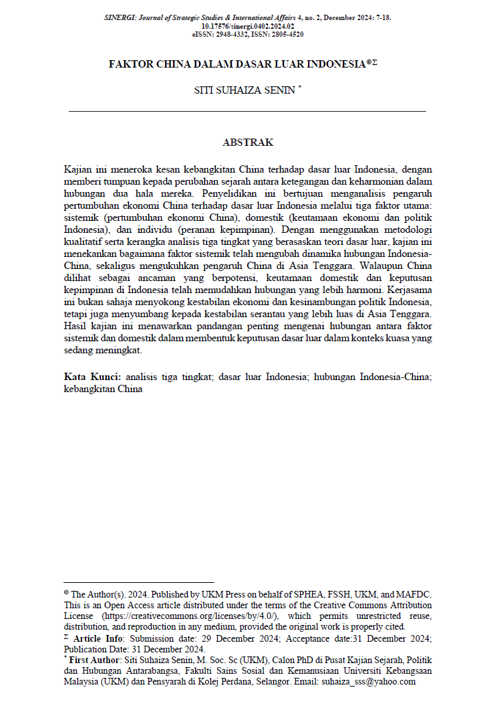Faktor China dalam Dasar Luar Indonesia
Main Article Content
Abstract
This study examines how China's rise has influenced Indonesia's foreign policy towards China, focusing on the historical shifts between tension and harmony in their relations. It aims to analyze the impact of China’s economic growth on Indonesia’s foreign policy through three main factors: systemic (China's economic rise), domestic (Indonesia’s economic and political interests), and individual (leadership roles). The study also evaluates the implications for Indonesia's economic continuity and political stability. Using a qualitative approach and applying foreign policy concepts with a three-level analysis framework, the study argues that systemic factors have reshaped the dynamics of Indonesia-China relations, strengthening China's influence in Southeast Asia. Despite perceiving China as a potential threat, domestic factors and Indonesia's leadership have facilitated a more harmonious relationship. This cooperation has supported Indonesia’s economic stability and political continuity, as well as contributed to broader regional stability in Southeast Asia.
Keywords: Level of analysis; Indonesian foreign policy; Indonesia-China relations; the rise of China
Downloads
Article Details

This work is licensed under a Creative Commons Attribution-NonCommercial-NoDerivatives 4.0 International License.
To learn more about our Open Acess and Copyright Policy, click here
References
Ba, D. Alice. 2003. "China and ASEAN: Renavigating Relations for a 21st Century Asia." Asian Survey 43(4): 622–647.
CSIS Smart Power Initiative. 2009. Chinese Soft Power and Its Implications for the United States: Competition and Cooperation in the Developing World. A Report of the CSIS Smart Power Initiative.
Hong, Liu. 2006. "The Transnational Construction of ‘National Allegory’: China and the Cultural Politics of Postcolonial Indonesia." Critical Asian Studies 38(3): 179–210.
Lai, Hong Yi, and Ting Seng Lim. 2007. Harmony and Development: ASEAN-China Relations. Singapore: World Scientific.
Morison, Wayne M. 2009. China Economic Condition. CRS Report for Congress.
Nor Azizan Idris, Zarina @ Zarina Othman, and Rashila Ramli. 2011. "Konstruktivisme Sosial dan Hubungan Antarabangsa Malaysia." Akademika 81(1): 39–50.
Osborne, Robin. 2001. Kibaran Sampari: Gerakan Pembebasan OPM dan Perang Rahasia di Papua Barat. Jakarta: Elsam.
Sukma, Rizal. 2009a. "Indonesia’s Response to the Rise of China: Growing Comfort Amid Uncertainties." NIDS Joint Research Series 4: 139–155. https://www.nids.mod.go.jp/english/publication/joint_research/series4/series4html.
Sukma, Rizal. 2009b. "Indonesia-China Relations: The Politics of Re-engagement." Asian Survey 49(4): 591–608.
Thaib, Lukman. 2004. "Kedinamikan Hubungan ASEAN-China: Rujukan Khas ke Atas Malaysia." In China: Isu dan Hubungan Luar, edited by Obaidellah Mohamad. Kuala Lumpur: Universiti Malaya.
Wong, John. 1987. Politik Perdagangan Cina di Asia Tenggara. Jakarta: Bumi Aksara.
Yi, Xiaohong. 2005. "ASEAN-China Free Trade Area: A Key Step Toward Pan-Asia Economic Integration—from the Perspective of Comparison with NAFTA and EU." Master’s thesis, University of Arizona.
Yuan, Jing-Dong. 2006. China-ASEAN Relations: Perspective, Prospects and Implication for U.S. Interests. Monograph, Books and Publications. US Army War College: USAWC Press.

